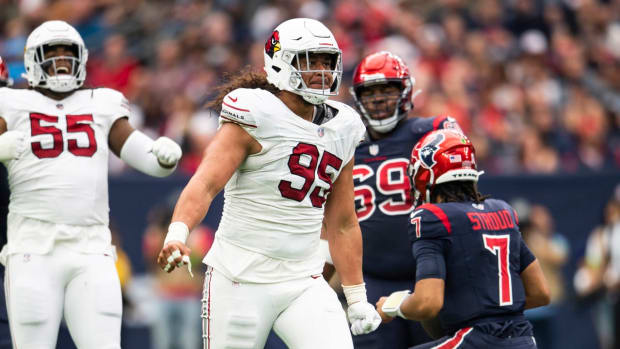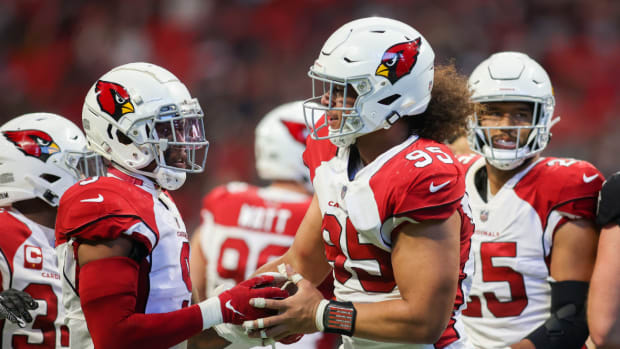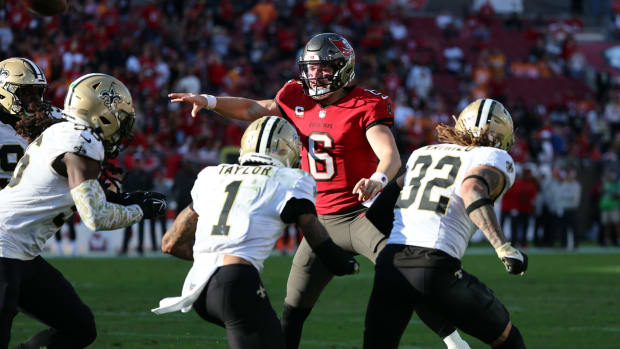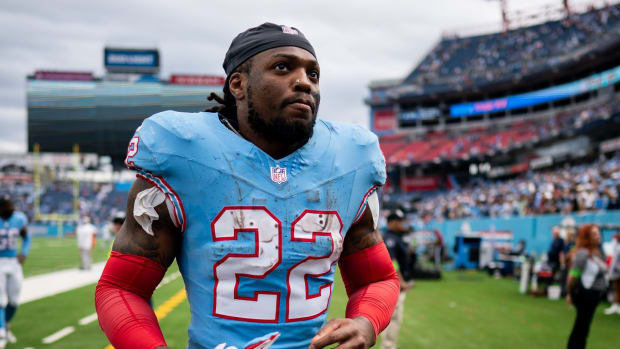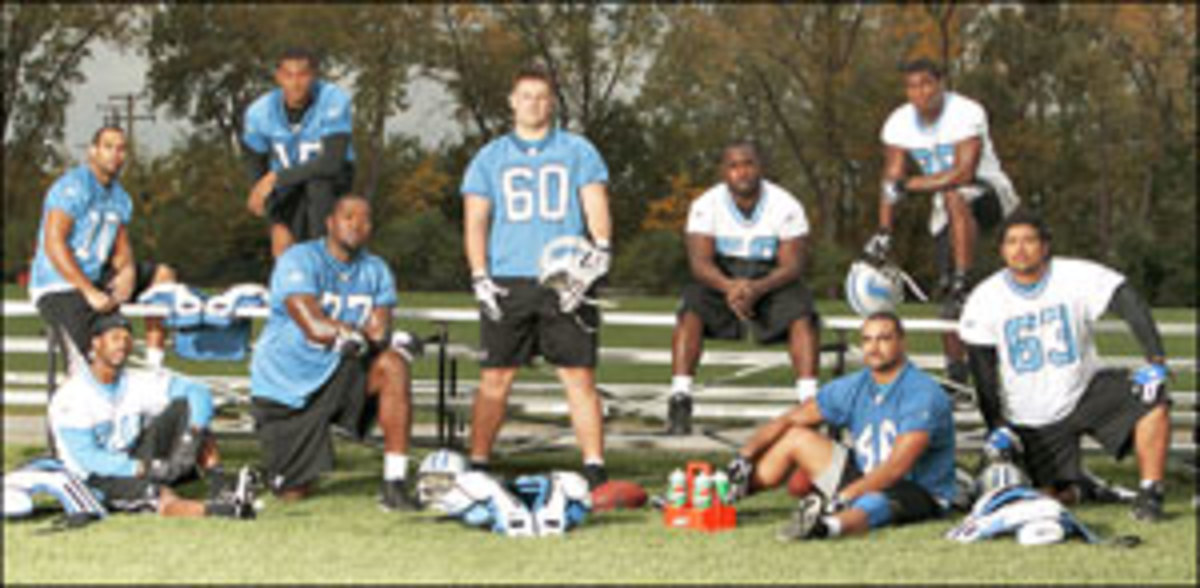
Shadow Warriors
On Sunday, as the Detroit Lions hosted the Tampa Bay Buccaneers at Ford Field, Detroit's practice squad players were sitting in leather lounge chairs high above the action, munching on quesadillas and chicken tenders, watching their teammates from a luxury suite. It is one of the few luxuries of the job.
In addition to the 53 players on the active roster, every NFL team has an eight- or nine-man practice squad -- a unit made up of players who fulfill a critical role but are not full-fledged team members. Practice squad players are paid a minimum of $4,700 per week, but their salaries are not guaranteed beyond today. They're eligible neither for long-term benefits nor for an NFL pension. If their team wins the Super Bowl, they're entitled to championship rings -- but not necessarily ones with real diamonds. In a league of bling, the practice squad is cubic zirconium.
The Lions' nine-player practice squad is diverse but not atypical. Ron Bellamy, a former Michigan standout, has one career NFL reception. Ben Noll, a former stockbroker, has one career start. Brandon Middleton, a former substitute teacher, has played in one NFL game. Jon Dunn, a former chef, has never gotten onto the field. These are the veterans of the group. None of them is older than 26.
While those players are trying to sustain NFL dreams, the younger ones are just embarking on theirs. Rudy Sylvan is an undrafted rookie free agent; LaMarcus Hicks, an undrafted second-year free agent; Buster Davis, a third-round pick in the 2007 draft; Ramzee Robinson, the last player drafted this year; and Salomon Solano, a free agent from Mexico who is part of the NFL's international development program.
They are not tackling dummies. The squad includes linemen who weigh in at 300 pounds and receivers who run a 4.4 40-yard dash. They come from such football powers as Florida State, Alabama and Virginia Tech. All were legitimate NFL prospects. Many of them still are.
But when they are on the practice squad, their names are listed below the 53-man roster, below the injured list, below the inactive list, not even on the depth chart. At this time a year ago none of the Detroit nine was in the NFL. Six were not playing organized football. Their career options included the Arena league, Canadian football and other fields altogether. "Look how far we've come," says Bellamy, 25. "Now we're just one play away."
One Play Away -- it is the mantra of practice squad players everywhere. They are indeed that close to making the active roster. But they are also one misplay away from losing whatever shot they had. One blown assignment in practice and they may be gone for good. Pro Bowlers and first-round draft picks cannot fathom the anxiety.
"It eats at your guts," says Middleton, 26. "It has to be the hardest job in the NFL."
On Monday the practice squad players study tape of a game they did not play in. On Tuesday they study tape of an opponent they will not play against. On Wednesday, Thursday and Friday, in practice, they pretend to be people they're not. And on Saturday, when the other players go to a hotel, the practice squad players go home, to one-bedroom apartments with month-to-month leases. They have the weekend off. But they would rather be working.
"I've seen it take the love away from a lot of guys," says Dunn, 25, a three-year starter at tackle for Virginia Tech (2002-04). "That's the secret to doing this: No matter what happens, you can't ever let it take the love away."
Dunn's devotion was tested last month. He was watching NFL games on his couch in Virginia Beach, monitoring injury lists. Practice squad players do not like to acknowledge the obvious: For their chance to arise, someone usually has to get hurt. One Play Away can be a euphemism for One Injury Away.
Dunn was among the Cleveland Browns' final cuts in 2006 and the New York Giants' final cuts this summer. A skilled chef, he thought about opening his own restaurant if football didn't work out. But before he could begin devising a menu, the Lions called. Two of their offensive linemen had suffered rib injuries against the Philadelphia Eagles on Sept. 23. Detroit needed another big body.
Dunn is 6' 7" and 324 pounds, so wherever he goes people ask him if he plays in the NFL. "Yes," he tells them. "I play for the Lions." Then they ask if they'll see him on television on Sunday. "Not exactly," he explains. "I'm practice squad."
That really confuses them.
Practice squads were instituted by the NFL in 1989 as a way to give teams a pool of extra bodies to draw from in practice or in the event of injury. At the time the squads comprised five players per team, but in 2004 they were expanded to eight. The Lions carry a ninth player as one of 11 teams participating in the league's international program, which is intended to cultivate new talent and grow the game outside the U.S.
Solano, 22, is a novelty on the practice squad, a player whose job is guaranteed through the season. He was a defensive tackle at the University of Tamaulipas in Mexico -- several dozen Mexican colleges play American football -- and hopes eventually to play in the NFL. More likely he'll end up as the defensive coordinator back at Tamaulipas. He has already taught the Lions' scheme at his alma mater. "The pressure on the other guys in the practice squad is a lot more," Solano says.
Lions coach Rod Marinelli views his squad as a farm system, a kind of football Triple A. Before their Week 3 game against Philly, the Lions called up Sylvan to fill in at tight end for the injured Dan Campbell. Then they sent Sylvan back down. Before the fourth game, as first-round pick Calvin Johnson nursed a bruised lower back, they elevated Middleton to the active roster. After the game they sent him down too.
Neither player had performed poorly. In fact, Middleton, who set Conference USA records for receiving yards and touchdown receptions as a senior at Houston in 2004, returned three kicks for a total of 70 yards and forced a fumble on special teams in a 37-27 win over the Chicago Bears. But when Johnson healed, the Lions needed a roster spot for him. Middleton had to go.
For just a moment Middleton missed Hightower High, outside Houston. At this time last fall he was a substitute teacher at Hightower. He stopped working out. He played flag football on weekends. When he told his students he used to be on the St. Louis Rams' practice squad, they didn't believe him. After they Googled his name, they accused him of creating a fake website with his picture and bio. "I had to call some former teammates and put them on speaker," says Middleton, 26. "After that I could feel a lot more respect in the classroom."
Something unexpected happened to Middleton during his time away: He enjoyed it. He knew his next paycheck was coming. He knew he could see his young daughter, Brielle, after work. And he knew, when the phone rang, it was not a coach calling to inform him of his release. "For the first time in my life I had stability," he says. "I wasn't waking up in the morning thinking, Is this it? Is this going to be my last day?"
He was done with football, but football wasn't done with him. Last winter NFL Europa called, and Middleton could not bring himself to hang up the phone. He played well enough with the Frankfurt Galaxy for the Lions to invite him to training camp. "I wanted somebody to just come out and tell me I wasn't talented enough to play in the NFL," Middleton says, "but nobody ever told me that."
When Middleton is losing hope, he need only look across the locker room at another former teacher. Jon Kitna started his professional career in the classroom, before joining the Seattle Seahawks' practice squad in 1996. Now he is the Lions' starting quarterback and an 11-year NFL veteran. "I know a lot of guys think the practice squad is a waste," Kitna says, "but it's the best thing I could have gone through."
They've all taken fairly circuitous routes to Detroit. For instance, Lions scouts found Noll at the football factory known as Northwestern Mutual Financial Network.
An all-Ivy League offensive lineman at Penn as a senior in 2003, Noll studied business and finance at the prestigious Wharton School. While his friends moved on to six-figure jobs as stock traders, he left Penn early to try to make it in the NFL. During the 2004 season he played in four games at guard for the Dallas Cowboys and started one, opening holes in a game in which Julius Jones scampered for 149 yards.
After Noll was waived by the Cowboys and then the Rams, he landed a job as a trader at Northwestern Mutual. He bought suits and ties. Then last December the Lions offered him a spot on their practice squad, and he put the finery back in the closet. "Nothing in the world compares to playing football," Noll says.
He is the rare NFL player who studies for forensic anthropology exams in the locker room. Noll is taking Internet courses toward his bachelor's degree from Penn. Last week he had a midterm. Next week he'll begin writing an essay on the fall of the Romanov dynasty during the Russian revolution. "I'm just like any other student," Noll says.
Except that his course load includes both the Bolsheviks and the Buccaneers. Every week the practice squad is required to learn everything about the opposing team. An offensive player such as Noll has to know the opposing defense in case he's suddenly activated. And he has to know the opposing offense in order to mimic it in practice.
The practice squad's primary role is to work on the scout team, giving the starters an accurate representation of what they'll see from the opposition on Sunday. Coaches call this representation the Look. Marinelli sometimes refers to the scout team as the Look Squads.
During practice last week Middleton and Buster Davis were supplying two of the most important looks. Middleton was pretending to be Joey Galloway, the Bucs' No. 1 receiver. Davis was pretending to be Derrick Brooks, Tampa Bay's Pro Bowl linebacker. Doing this every week can cause an identity crisis.
Davis wants to be the next Derrick Brooks, not his scout-team doppelgänger. Like Brooks, he was a star linebacker at Florida State. He started 37 consecutive games, earned second-team All-America honors in 2006 and was drafted in the third round, 69th overall, by the Arizona Cardinals last April.
But during training camp the Cardinals saw a player who was uninspired and overweight. They wanted to send Davis to their practice squad, but he refused the assignment. Arizona released him before the season began, swallowing his $610,000 signing bonus.
Davis nevertheless ended up exactly where he didn't want to be -- on an NFL practice squad. But in Detroit he has come to appreciate the role. "I'm not mad," he says. "It's a teaching tool. Ten or 15 years from now I'll be glad things weren't given to me." He pauses for a moment. "But I'll be up there this season."
Up there is on the active roster. Rookies make a minimum of $16,700 a week, with benefits. If they play three or more games, they get insurance in the off-season and earn a year toward their pensions. And they get to play football on Sunday.
Ramzee Robinson had no reason to think he would be up there this season. As the last player taken in the draft, No. 255 overall, he was dubbed Mr. Irrelevant -- the perfect title for a practice squad player. It appeared that the highlight of his year would be the trip he took in June to Newport Beach, Calif., where he was the guest of honor at the annual Irrelevant Week and received the traditional Lowsman Trophy.
When Robinson did not make the Lions' active roster out of training camp, he wondered how he could support his family in Alabama. So he applied for a second job, flipping hamburgers at a Red Robin. The restaurant manager thought it was a prank -- why would a Lions defensive back want to be a fry cook? -- and rejected the application. He told Robinson to concentrate on football full time.
The advice paid off last week. Two Lions cornerbacks went down with injuries, and Robinson prepared for his call-up. But on the Wednesday before the game, the club signed Dovonte Edwards, a corner who'd last played for the Vikings in 2005. Robinson fumed. "Doing this job," he says, "you're always playing with fire." He could have packed up and left. Just as practice squad players can be released at any time, they can also sign to join another team's active roster if they get an offer. But Robinson stayed, and during practices last week it became apparent to the coaches that he was ready to play. He knew the system. Edwards was still learning it. On Saturday afternoon Lions player personnel director Sheldon White informed Robinson that he was going to make his NFL debut.
Robinson stayed up late Saturday night studying his playbook. He called family members, but they didn't have enough time to fly to Detroit. They had to rush just to buy the DirecTV package.
At 1 p.m. on Sunday, when the Lions lined up to kick off against the Bucs, Robinson was on the field. Mark Jones was back deep for Tampa Bay. As the ball was booted, Robinson sprinted down the sideline. Jones brought it out, and Robinson darted toward the middle. At the 22-yard line he dived at Jones's legs and spun him to the turf. First NFL play, first NFL tackle.
Robinson hopped out of the scrum, pumping his fists and yelling, like a guy who had just been set free. In fact, he had been set free -- from the practice squad. "The way I reacted right there," he said afterward, "was an illustration of everything you go through."
In the luxury box the guys were rooting for their own. All around, it was a good day for the practice squad. Not only did Robinson see significant time on special teams, but Sylvan also made the active roster, started and played extensively; Marinelli said afterward that both had performed well. The Lions beat the Bucs, improving their record to 4-2, and the squad played a subtle but significant role in the victory. Its members clearly had given all the right looks during the week.
"Sitting up there, I root for the Lions like I've been here my whole life," says Dunn, the offensive tackle. "This is my team. They've got me to the end." But what if another team -- say, one that needs an extra offensive tackle and has an open spot on the active roster -- calls tomorrow? "Oh," says Dunn. "Then I guess I'd have to root for them."
As for Robinson, he found out just how fleeting freedom can be. On Monday the Lions waived him, standard NFL procedure for a player moving off the active roster. Once Robinson cleared waivers, 24 hours later, the Lions expected to re-sign him, to the practice squad once more.

































